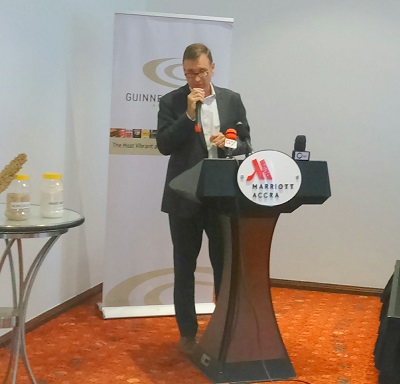
Guinness Ghana Limited has committed to sourcing 70 per cent of its raw materials in the country by 2020 as part of efforts to lead the Local Raw Material (LRM) sourcing drive.
This was announced by the Managing Director (MD) of Guinness Ghana, Gavin Pike during the launch of the company’s LRM Policy in Accra on Thursday.
According to the MD, the company currently sources 55 per cent of its raw materials in Ghana but working towards making it 70 per cent by the end of next year.
The move, he said, would support the government’s Planting for Food and Jobs initiative as farmers would get market for their produce.
“This would also reduce the demand on foreign sourcing and also critical to the long term development plan of the company and the country as a whole,” he said.
“The objectives of our LRM programme include pioneering grain-to-glass sustainability and supporting government’s policy initiatives such as Planting for Food and Jobs and One District, One Factory,” he stressed.
The programme already he said had benefitted over 30,000 farmers, producing mainly sorghum, maize and cassava adding that, over 210,000 people along the agricultural value chain have seen significant improvement including small holder farmers, aggregators, processors, input dealers and traders.
“The beneficiaries have seen significant transformation in their quality of life such as investments in their children’s education, housing, water, sanitation, health and nutrition,” he added.
Corporate Relations Director at Guinness Ghana, Sylvia Owusu-Ankomah said, from 2007 till date the company had increased the uptake of local raw materials in their production, starting from just about four percent to 55 percent and moving forward.
“This is a journey that we would continue because it does not only impact on our production but also on the community and the livelihoods of farmers,” she stated.
In order to achieve their objectives she said, they would empower farmers with the necessary tools and training to ensure that the quality of grains that they would produce were up to global standards.
She called for collaboration with the government to ensure that they have the needed stability within the policy landscape to develop and achieve their goals locally.
BY MICHAEL D. ABAYATEYE




